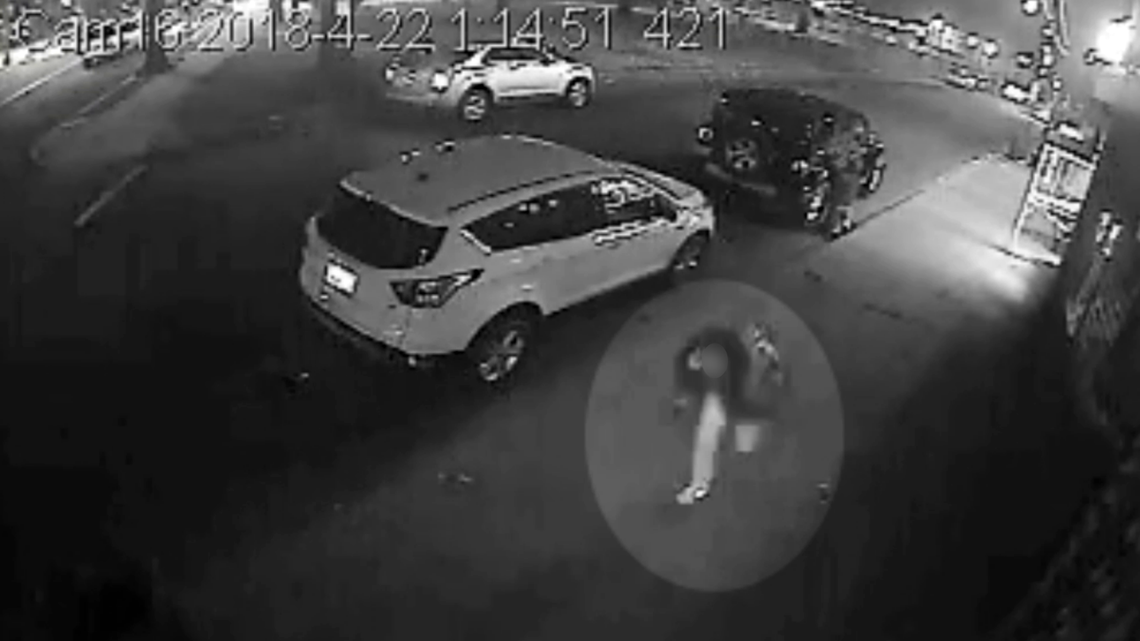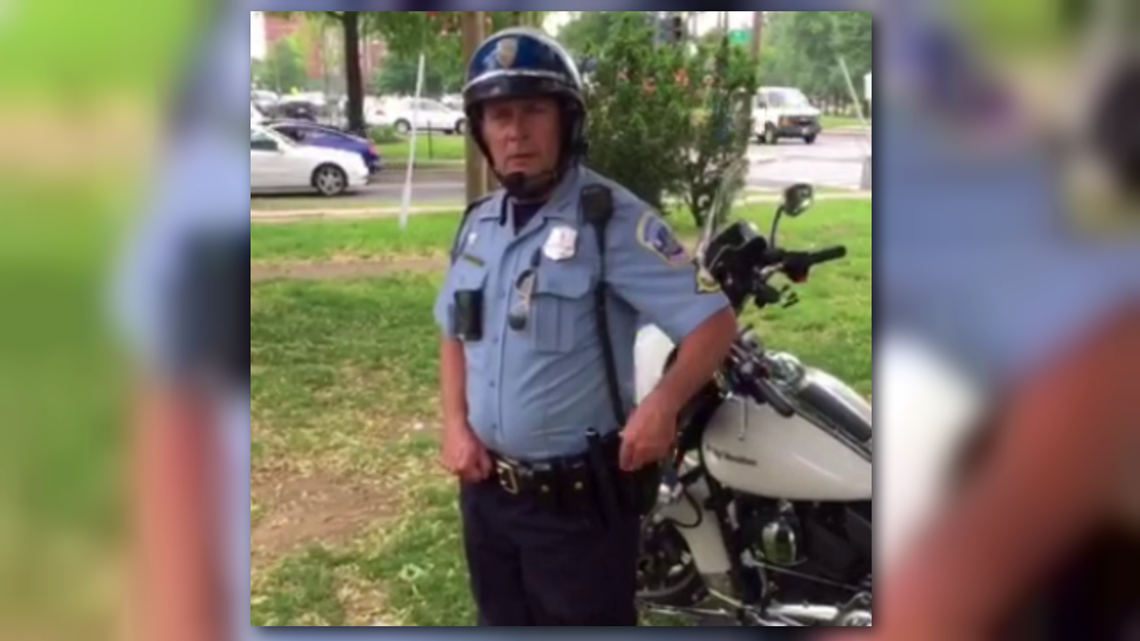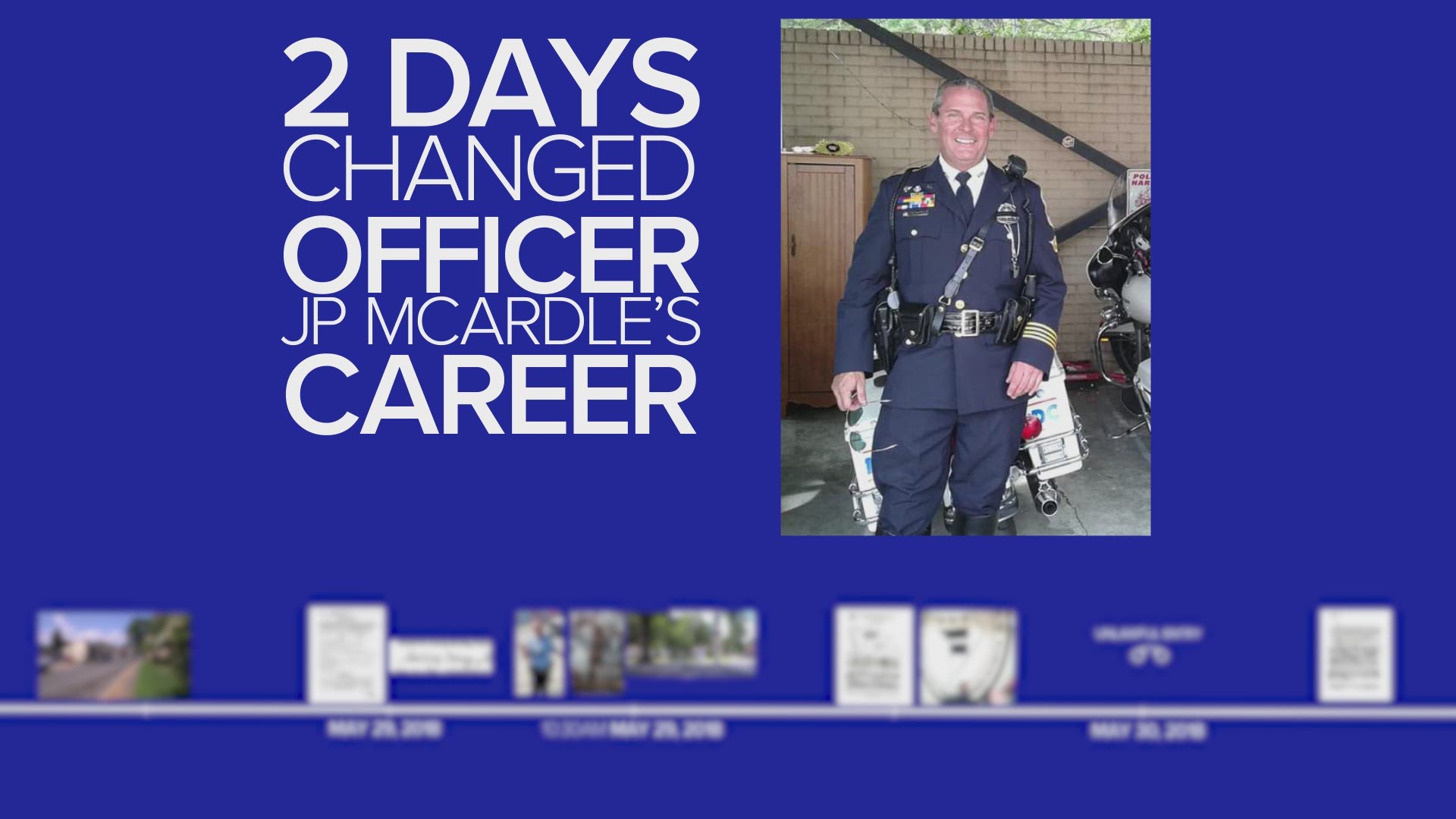WASHINGTON — A D.C. Metropolitan Police Department officer is speaking out about the government agency that found him guilty of harassment and retaliation – saying he feels the process was slanted against him.
"I’ve been wronged," officer J.P. Mcardle, who patrols, MPD’s Fifth District, said.
The series of events that caused Mcardle to feel that way started May 29, 2018. Mcardle was patrolling his beat along Brentwood Road in Northeast D.C. when he spotted a man sitting in a public park.
That man was no stranger to officer Mcardle, who provided security camera video in which Mcardle said you can see the same man in a shootout along that same block in March of 2018.


No one was injured by the gunfire, and prosecutors said the video wasn’t clear enough to charge anyone with a crime.
That frustrated the business owners across the street, who asked not to be quoted directly, but told WUSA9 they were growing increasingly upset with what they say they were seeing: that same man making open-air drug sales.
Greg Fernebok, the property manager of The Shoppes at Brentwood, filled out an official barring notice prohibiting him from coming inside the businesses for selling drugs around their customers.
When Officer Mcardle noticed this same man sitting across the street from the Shoppes at Brentwood in a small green space, Mcardle said he pulled over to tell him he wasn’t welcome inside those stores anymore.
"They wanted him barred from the businesses," Mcardle said. "They said, ‘We don’t want this. We told him we don’t want this. We want this guy to stop.’ He was selling and smoking his product inside the businesses."
Mcardle said he told the man about the barring notice and that he would arrest him if he violated it, but – in a complaint later filed with the Office of Police Complaints obtained by WUSA9 – the man said Mcardle went a step further: telling him to leave that public park, even though it wasn't covered by the barring notice.
The man did leave the park, and then went down to D.C.'s Office of Police Complaints and lodged a harassment complaint against Mcardle. Twenty-four hours later the man was back, and so was Mcardle.
Mcardle said he spotted the man inside one of those stores he'd just been banned from and arrested him for unlawful entry -- the equivalent of trespassing. The man then filed a new complaint accusing Mcardle of retaliation. In it, he said Mcardle only arrested him after he told him about the original complaint.
In total, the man filed six complaints against Mcardle: racial discrimination (the man is black and Mcardle is white); retaliation; and four counts of harassment.
Following a review of the incident, the OPC investigator assigned to the case found that four of the complaints – the count of retaliation and three of the harassment counts – had enough merit to pass along to a complaint examiner.
The complaint examiner ultimately determined there was insufficient evidence to uphold the retaliation complaint, and Mcardle was exonerated of one of the harassment complaints for unlawful arrest when the man later pleaded guilty. Two of the harassment complaints – one for intimidation and one for an improper move along order – were upheld, though.
"[I was] floored," Mcardle said after learning of OPC’s decision.
In a statement to OPC the officer wrote, "At no point during this encounter did I order anyone out of the park."
In the 17-page OPC report documenting the complaint, investigator Lindsey Murphey said she watched Mcardle’s body worn camera video of the initial exchange and heard the officer say, "Go sell that stuff somewhere else. Go somewhere else."
Murphy said Mcardle later said, "I don’t want you in this block because the owner told me to make sure I served you up."
Murphy also said officer Mcardle reached for his gun during the confrontation.
But a still image from cell phone video the investigator used to draw that conclusion shows officer Mcardle’s left hand on his utility belt. Not his right.


Why does that matter?
"I’m a right-handed shooter," Mcardle said. "This is a radio," he said, while pointing to his utility belt on his left side.
But because of the alleged contact with his gun, and, according to the report, Mcardle telling the man he was going to call for additional units if he didn’t leave the park, Murphy ruled Mcardle improperly used "displays of force and threats" to leave a public space. She said Mcardle "did not have the legal authority" to do that, and thus determined there was merit to the harassment complaints for intimidation and an improper move along order.
OPC also found merit in a third harassment charge, saying MPD policy required him to physically show the man the barring notice, not just tell him about it. Mcardle didn’t do that until the following day when he found the man inside one of the stores he'd been barred from.
And because the man left the property before Mcardle physically showed him the barring notice and handcuffed him, OPC ruled the officer lacked probable cause to actually make the arrest, which was also harassment in eyes of OPC.
But the man later pled guilty to the unlawful entry charge.
"She was out to get me from the get-go," Mcardle said of the OPC investigator.
Murphy also ruled that, since the actual arrest took place "one minute after the officer became aware" the suspect had filed a complaint against him, there was merit to the retaliation complaint as well.
OPC policy protects people who file police complaints from adverse action by the police officer in question. MPD Fraternal Order of Police Chairman Stephen Bigelow believes that rule puts officers in a tough spot.
"If you were a criminal what would you do?" Bigelow said to WUSA9. "You would go down there and file every police complaint you could against these officers to hinder them from doing their job."
Despite Mcardle’s pleas that OPC was getting it wrong and he was just doing his job, the veteran police officer was hit with this first official reprimand for misconduct.
Bigelow said the harassment and retaliation charges are now "a scarlet letter" on the officer’s record that could keep him from being promoted or hurt his credibility in court.
But what about the credibility of the man who filed that complaint against Mcardle? Court records show in July 2018 he was once again arrested for selling drugs in the same block Mcardle was trying to get him out of.
He declined WUSA9's repeated requests for an interview.
Just three months earlier, in July 2019, OPC’s Executive Director Michael Tobin sat down with WUSA9 to discuss the importance of holding police officers accountable.
"Every officer takes an oath to follow the constitution, to do their job in accordance with the constitution," Tobin said.
But Tobin declined to comment about this specific case and Mcardle’s concerns with the process, saying in an email, “I have a longstanding policy of not commenting on specific disciplinary cases."
You can read Tobin’s full email here:
"Hello Eric
I understand your viewpoint. I have a longstanding policy of not commenting on specific disciplinary cases, and for good reason. If an officer has a dispute with a disciplinary case, there are many review and appeal protections available. In fact, MPD officers have more employee protections available to them than most public or private employees.
"I am disappointed that you feel I am required to appear on camera in this matter. As you know, I have done two in depth interviews with you recently for periods of about one hour each, answering a full panoply of unedited questions from you on any subject relevant to our office with absolutely no restrictions. In addition, we have responded to all of your records requests in an open fashion, even creating new records and consolidating them for easier reference far beyond any FOIA requirements. We have cooperated with your reporting efforts to an extraordinary degree and have expended staff time to accommodate your requests on multiple occasions, and without delay.
"The journalist-friends that I have related this issue to concur that even public officials can and do defer camera interviews on occasion, as I have done so in the past on specific disciplinary issues. I am at a loss to understand why you are unwilling to respect this request regarding this singular issue despite all of the other open communications and camera interviews we have had. This is my point of view of which you still may disagree, but I hope this singular issue does not affect our professional relationship and shared goals.
"You may of course use any portion of this communication and the previous written statement regarding this issue, but I do ask that you respect my desire to not supply camera interviews regarding any specific disciplinary cases, even if it is to indicate that I have no comment."
Mcardle is still talking about the case that left him feeling persecuted for simply being a police officer.
"We live on a justice system that is based on fair representation, the facts," Mcardle said. "Those facts are not out there."
OPC is an all-civilian office, and that’s by design to avoid conflicts of interest. But WUSA9 learned many OPC investigators have zero law enforcement experience before coming to OPC – although those investigators are required to have 20 hours of police training and eight hours of police ride-alongs.
Mcardle, who is still patrolling the same block, believes involving former police officers in these decisions would make the process fairer.

